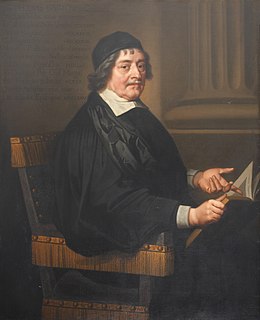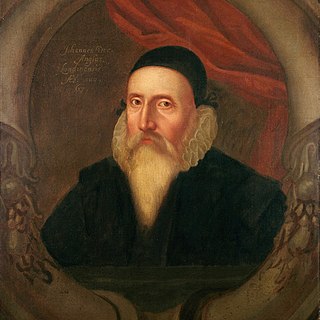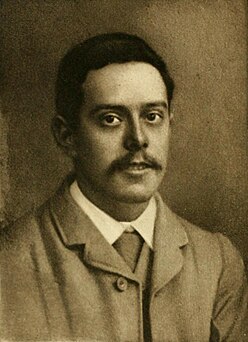
Richard Julian Roberts FSA (18 May 1930 – 20 October 2010) was a British librarian, bibliographer, and scholar. [1]
Roberts was educated at King Edward's School, Birmingham, and Magdalen College, Oxford, where he started reading Classics, but switched to English in his first year. [1]
Biography
In the early 1950s, Roberts began his career at Lambeth Palace Library in London. In 1958, he was appointed as an Assistant Keeper at the British Museum, where the collections which were later to form the British Library were then located. In 1961, he became joint secretary of the Bibliographical Society with Sir Frank Francis, [2] a post he held for 20 years.
In 1974, Roberts returned to Oxford to become Keeper of Printed Books in the Bodleian Library of the University of Oxford. He was elected a Fellow of Wolfson College in association with his post, and became the college's Vice-gerent (deputy head of the college) during 1983–84. At the Bodleian Library, Roberts oversaw the introduction of computerised cataloguing and the acquisition of important collections such as the Dunston Collection in 1981, the Marlborough Vicars Library in 1985, and the Opie Collection of Children's Literature in 1988. In 1983, he was elected a Fellow of the Society of Antiquaries in London. On the premature death of John Jolliffe (Bodley's Librarian) in 1985, he became Acting Librarian and then Deputy Librarian, a post that he held until his retirement in 1997.
Jointly with Andrew Watson in the early 1970s, Roberts edited John Dee's Library Catalogue. John Dee (1527–1608/9) was a consultant to Queen Elizabeth I who devoted much of his life to the study of alchemy and divination. [3] [4] They published a new edition in 1990 [5] and continued to provide amendments and corrections. [6] Roberts also contributed to the planning of the New Cambridge Bibliography of English Literature, with his colleague Ian Willison. [7] He provided much of the poetry section. [1]
Roberts married Anne Duce and they had two children. While working at Oxford, he lived at the village of Tackley in Oxfordshire, north of Oxford.
Related Research Articles

Thomas Hearne or Hearn was an English diarist and prolific antiquary, particularly remembered for his published editions of many medieval English chronicles and other important historical texts.

Anthony Wood, who styled himself Anthony à Wood in his later writings, was an English antiquary. He was responsible for a celebrated Hist. and Antiq. of the Universitie of Oxon.

Thomas James was an English librarian and Anglican clergyman, the first librarian of the Bodleian Library, Oxford.

A national library is a library established by a government as a country's preeminent repository of information. Unlike public libraries, these rarely allow citizens to borrow books. Often, they include numerous rare, valuable, or significant works. A national library is that library which has the duty of collecting and preserving the literature of the nation within and outside the country. Thus, national libraries are those libraries whose community is the nation at large. Examples include the British Library, and the Bibliothèque nationale de France in Paris.

Thomas Barlow was an English academic and clergyman, who became Provost of The Queen's College, Oxford, and Bishop of Lincoln. He was seen in his own time and by Edmund Venables in the Dictionary of National Biography to have been a trimmer, and have a reputation mixed with his academic and other writings on casuistry. His views were Calvinist and strongly anti-Catholic – he was among the last English bishops to dub the Pope Antichrist. He worked in the 1660s for "comprehension" of nonconformists, but supported a crackdown in the mid-1680s and declared loyalty to James II of England on his accession, though he had supported the Exclusion Bill, which would have denied it to him.
Sir Stephen Gaselee was a British diplomat, writer, and librarian.

The Book of Soyga, also titled Aldaraia, is a 16th-century Latin treatise on magic, one copy of which was owned by the Elizabethan scholar John Dee. After Dee's death, the book was thought lost until 1994, when two manuscripts were located in the British Library and the Bodleian Library, under the title Aldaraia sive Soyga vocor, by Dee scholar Deborah Harkness. The Sloane MS 8 version is also described as Tractatus Astrologico Magicus, though both versions differ only slightly.

John Dee was an English mathematician, astronomer, astrologer, teacher, occultist and alchemist. He was the court astronomer for, and advisor to, Elizabeth I, and spent much of his time on alchemy, divination and Hermetic philosophy. As an antiquarian, he had one of the largest libraries in England at the time. As a political advisor, he advocated the foundation of English colonies in the New World to form a "British Empire", a term he is credited with coining.

Falconer Madan was Librarian of the Bodleian Library of Oxford University.

Humfrey Wanley was an English librarian, palaeographer and scholar of Old English, employed by manuscript collectors such as Robert and Edward Harley. He was the first keeper of the Harleian Library, now the Harleian Collection.

The head of the Bodleian Library, the main library at the University of Oxford, is known as Bodley's Librarian: Sir Thomas Bodley, as founder, gave his name to both the institution and the position. Although there had been a university library at Oxford since about 1320, it had declined by the end of the 16th century. It was "denuded" of its books in 1550 in the time of King Edward VI when "superstitious books and images" that did not comply with the prevailing Anglican view were removed. Poor management and inadequate financial resources have also been blamed for the state of the library. In the words of one history of the university, "as a public institution, the Library had ceased to function." Bodley volunteered in 1598 to restore it; the university accepted the offer, and work began soon afterwards. The first librarian, Thomas James, was selected by Bodley in 1599. The Bodleian opened in 1602, and the university confirmed James in his post. Bodley wanted the librarian to be "some one that is noted and known for a diligent student, and in all his conversation to be trusty, active, and discrete, a graduate also and a linguist, not encumbered with marriage, nor with a benefice of Cure". James, however, was able to persuade Bodley to let him marry and become Rector of St Aldate's Church, Oxford.
John William Jolliffe was a British librarian and academic who was Bodley's Librarian from 1982 until his death.
Sir Arthur Ernest Cowley, was a British librarian who was Bodley's Librarian from 1919 until a couple of months before his death. He was also a leading Semitic scholar.

Edward Williams Byron Nicholson was a British author and Bodley's Librarian, the head of the Bodleian Library at the University of Oxford, from 1882 until his death in 1912.

Sir Frank Chalton Francis was an English academic librarian and curator. Almost all his working life was at the British Museum, first as an assistant keeper in the department of printed books, and later as secretary of the museum, keeper of printed books and, between 1959 and 1968, director and principal librarian of the museum.
Edward Gordon Duff, known as Gordon Duff, was a British bibliographer and librarian known for his works on early English printing.

Brian Twyne was an antiquary and an academic at the University of Oxford. After being educated at Corpus Christi College, Oxford, and becoming a Fellow of the college in 1606, he published his one main work, a history of the university, in 1608. This was designed to prove that Oxford was older than Cambridge University, and has been described by a modern writer as a "remarkable achievement for a young scholar of twenty-eight." His main accomplishment was to play a leading role in the revision of the university statutes under William Laud. He was rewarded by appointment in 1634 to the new position of Keeper of the Archives, in which role he obtained a new royal charter for Oxford to confirm its rights and privileges, and helped the university in its disputes with the city authorities.

Robert George Collier Proctor, often published as R. G. C. Proctor, was an English bibliographer, librarian, book collector, and expert on incunabula and early typography.
Albinia Catherine de la Mare,, known in print as A.C. de la Mare and informally as “Tilly”, was an English librarian and palaeographer who specialised in Italian Renaissance manuscripts.
References
- 1 2 3 Obituary: Julian Roberts, The Times , 17 November 2010.
- ↑ R. J. Roberts, Obituary: Sir Frank Francis KCB: 1901–1988. The Library: Transactions of the Bibliographical Society , s6-XI(2):150–154, 1989. doi : 10.1093/library/s6-XI.2.150
- ↑ R. Julian Roberts, Dee, John (1527–1609), Oxford Dictionary of National Biography , Oxford University Press, September 2004; online edition, May 2006.
- ↑ Julian Roberts, ed. (2005). "A John Dee Chronology, 1509–1609". Renaissance Man: The Reconstructed Libraries of European Scholars: 1450–1700 Series One: The Books and Manuscripts of John Dee, 1527–1608. Adam Matthew Publications. Archived from the original on 20 July 2008. Retrieved 27 October 2006.
- ↑ Julian Roberts and Andrew G. Watson (editors), John Dee’s Library Catalogue (Oxford University Press, 1990). ISBN 978-0-19-721795-5.
- ↑ Julian Roberts and Andrew G. Watson, John Dee's Library Catalogue: additions and corrections Archived 8 September 2008 at the Wayback Machine , Bibliographical Society, UK.
- ↑ Frederick Wilse Bateson (editor), New Cambridge Bibliography of English Literature (Cambridge University Press, 1974). ISBN 978-0-521-20004-2.
Richard Julian Roberts | |
|---|---|
| Born | 18 May 1930 |
| Died | 20 October 2010 (aged 80) |
| Nationality | British |
| Academic background | |
| Alma mater | Magdalen College, Oxford |
| General | |
|---|---|
| National libraries | |
| Other | |